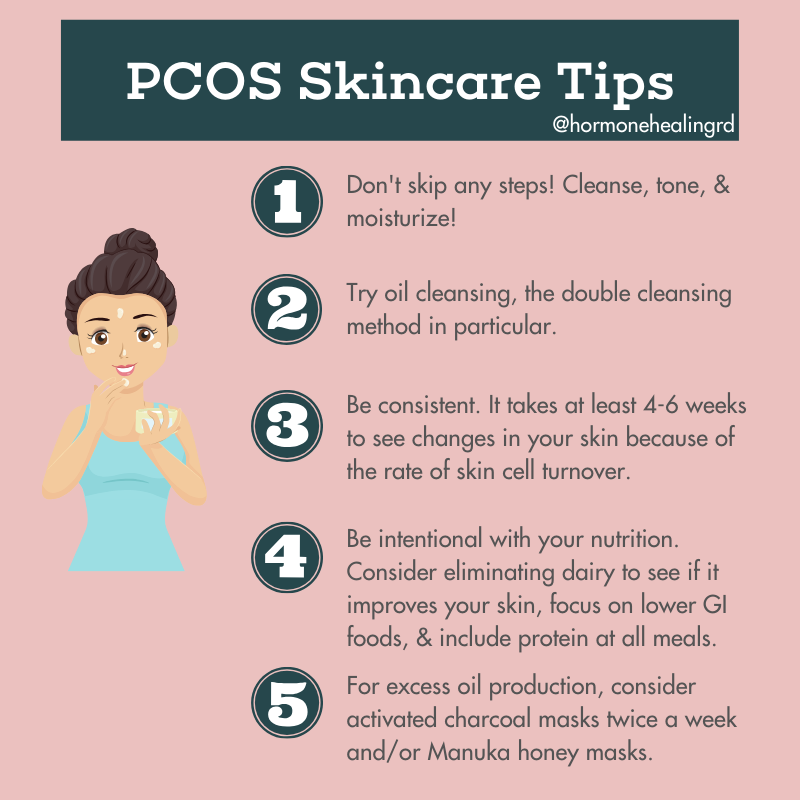Understanding polycystic ovarian syndrome isn’t just about understanding the symptoms and medication options. It’s also about understanding how this condition can affect your day to day life, and the things you can do to help alleviate symptoms on your own.
While there is no one size fits all approach, lifestyle changes, such as skin care options and nutrition recommendations, can help you manage the symptoms of your PCOS. Check out some of my favorite lifestyle recommendations below.
Still not familiar with PCOS? Be sure to check out the first three installments in my Understanding PCOS series first, starting with Part 1 here!
PCOS and Skin Care:
The majority of the women I treat with PCOS experience acne as a symptom of their condition. What contributes to acne anyway? Well, it’s never just one thing. Often high androgens like testosterone and DHT are the culprit for PCOS, but they aren’t the only issue.
You also have to remember what leads to those high androgens and that is high levels of insulin.
This is why it’s important to look at that first.
Here’s how I typically see it work – high insulin levels due to insulin resistance and/or high glycemic foods that raise blood sugar which raises androgen levels. This increases oil production in the skin, leaving you more susceptible to clogged pores and acne. High androgens can also lead to lower levels of diversity in gut bacteria, which can lead to inflammation and dysfunction in the gut, further exacerbating acne.
If you’ve taken the pill (most women with PCOS are prescribed this), this can lead to nutrient deficiencies that also negatively impact the skin.
The good news is that there are skin care options that can be a great choice for women with PCOS. While these tips are great for anyone struggling with their skin, they’re excellent options for women struggling with polycystic ovarian syndrome and are some of my favorite to recommend to clients.

PCOS and Supplements
One of the biggest struggles I see women with PCOS deal with is high androgens and the laundry list of symptoms they lead to (acne, hair growth, hair loss, irregular cycles, infertility, etc.). I get a lot of questions on what supplements are best for reducing androgens, but the first line of defense when it comes to androgens should be your nutrition.
You always want to think about what is driving the increase in androgens and for those with PCOS, it’s insulin resistance. You can also have elevated androgens after coming off the pill, to which this can also apply.
There are some supplements I especially like for high androgens. Remember to always talk with your doctor before taking a new supplement, especially if you are on medication. You want to make sure there aren’t any contraindications for you, as everyone is different.
Top Supplements To Reduce Androgens:
NAC: NAC is an antioxidant and amino acid that is shown to reduce androgens in PCOS. Research shows 1.6-3g/day has been beneficial.
Inositol: The most studied supplement for PCOS, inositol improves insulin resistance and also lowers androgens. It can also improve the function of the ovaries. 1.2-4g/day is shown to be effective. Start small with this one and work with a practitioner.
Saw Palmetto: The berries of the saw palmetto palm contain plant sterols, fatty acids, and anti-inflammatory compounds that inhibit the conversion of androgens. 160-320mg/day has been shown to be effective.
Spearmint: There needs to be more research on this one, but research has shown that there is potential to inhibit testosterone and restore follicular development in those with PCOS. The study used 150-300mg spearmint oil.
PCOS and Insulin Management
Managing your insulin is important when you’re diagnosed with PCOS. Like we’ve discussed before, insulin resistance is a major factor in PCOS, and can lead to increased androgens and additional symptoms.
Managing your insulin can be, though, can be done in part through your lifestyle choices. Things like incorporating weight lifting to your daily exercise routine, balancing your meals with protein, starch, fiber, and fats, and getting 8 hours of sleep can be truly beneficial to managing your insulin resistance. Reducing stress, increasing your overall fiber intake, and reducing your sugar intake can also help to manage your insulin resistance.
Polycystic ovarian syndrome is not a one-size fits all disease. It is an often changing condition, and finding what works for you when it comes to nutrition, lifestyle, and supplementation is a truly important part of managing your disease.
The first step in figuring out how to control your symptoms is understanding the root cause of your condition. the Hormone Healing RD nutrition team can help you do that. i’m currently taking on 1:1 clients. if you’d like to explore what it would be like to work together and if we are a good fit, fill out this form to get more details!
